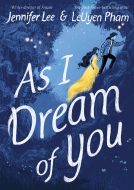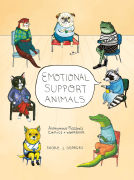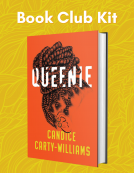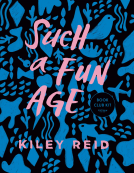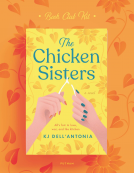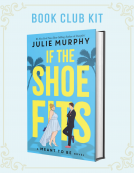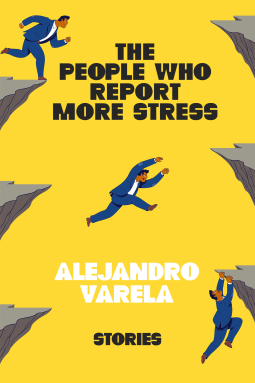
The People Who Report More Stress
Stories
by Alejandro Varela
This title was previously available on NetGalley and is now archived.
Send NetGalley books directly to your Kindle or Kindle app
1
To read on a Kindle or Kindle app, please add kindle@netgalley.com as an approved email address to receive files in your Amazon account. Click here for step-by-step instructions.
2
Also find your Kindle email address within your Amazon account, and enter it here.
Pub Date Apr 04 2023 | Archive Date Mar 28 2023
Astra Publishing House | Astra House
Talking about this book? Use #ThePeopleWhoReportMoreStress #NetGalley. More hashtag tips!
Description
LONGLISTED FOR THE 2024 STORY PRIZE
LONGLISTED FOR THE 2024 ASPEN WORDS LITERARY PRIZE
"Alejandro Varela’s The People Who Report More Stress: Stories is a master class in analyzing the unspoken." —The New York Times
"A searing collection about gentrification, racism, and sexuality." —Publishers Weekly (Starred Review)
The People Who Report More Stress is a collection of interconnected stories brimming with the anxieties of people who retreat into themselves while living in the margins, acutely aware of the stresses that modern life takes upon the body and the body politic.
In “Midtown-West Side Story,” Álvaro, a restaurant worker struggling to support his family, begins selling high-end designer clothes to his co-workers, friends, neighbors, and the restaurant’s regulars in preparation for a move to the suburbs.
“The Man in 512” tracks Manny, the childcare worker for a Swedish family, as he observes the comings and goings of an affluent co-op building, all the while teaching the children Spanish through Selena’s music catalog.
“Comrades” follows a queer man with radical politics who just ended a long-term relationship and is now on the hunt for a life partner. With little tolerance for political moderates, his series of speed dates devolve into awkward confrontations that leave him wondering if his approach is the correct one.
A collection of humorous, sexy, and highly neurotic tales about parenting, long-term relationships, systemic and interpersonal racism, and class conflict from the author of the National Book Award finalist The Town of Babylon, The People Who Report More Stress deftly and poignantly expresses the frustration of knowing the problems and solutions to our society’s inequities but being unable to do anything about them.
Available Editions
| EDITION | Other Format |
| ISBN | 9781662601071 |
| PRICE | $26.00 (USD) |
| PAGES | 256 |
Average rating from 35 members
Featured Reviews
Thank you, Astra Publishing House, Astra House, for allowing me to read The People Who Report More Stress early!
Alejandro Varela has such a compelling voice and writing style.. I loved his debut The Town of Babylon and this story collection was as great, if not better.
 Maurice W, Reviewer
Maurice W, Reviewer
Thank you to Astra House and NetGalley for sending me an eARC in exchange for an honest review.
Before I begin, I have to admit that I have not yet read Alejandro Varela’s debut, but after this, I will surely be getting to it soon!
The People Who Report More Stress contains thirteen interconnected short stories—most of which center around an interracial gay couple. Again, I have never read any of Varela’s writing, but by the end of the first few stories, I was sure this would be something special.
Yes, these stories are routinely distressing—yet there is also so much love and humor present that I found myself wanting to stay within some of them long after they ended.
Varela writes about many issues such as race as it relates to housing, politics, immigration, and academia—but also about family, relationships, and sexuality. Several of these ideas are present in every story, but they never manage to feel tedious. The prose is remarkable, and so is the way Varela moves through characters and time to craft a collection that ultimately feels cohesive and impactful.
I look forward to revisiting this upon release and I hope to get to The Town of Babylon sometime next year!
 Reviewer 485643
Reviewer 485643
The People Who Report More Stress is a hilarious collection of stories tackling a wide range of issues from parenting to racism. Both politically relevant and entertaining, Alejandro Varela has struck the right balance to create the perfect novel for our current moment.
 Reviewer 969236
Reviewer 969236
This short story collection is genius. I thoroughly enjoyed all of them. Whether it's a story about playground politics, online dating, navigating long-term relationships and heteronormative standards for gay couples with children, a tutor of a rich Swedish family, geopolitics at the UN, interracial dating, Alejandro's writing makes me giggle bc it's so clever. And I had to look up several words that I didn't know--love it!
“It was a sort of triplication of hopelessness.”
“The ignominy, however, of being denied a ride home in full light—on a day when standing upright bordered on hardship—was in a category all its own.”
Alejandro writes about the WTF microlevel moments around race/class/gender/sexuality with macrolevel impacts in ways that remind me of Rumaan Alam in Leave the World Behind.
“It rankles me dearly to meet so many white people who use their inheritances and no-interest loans to buy homes in previously Black and brown neighborhoods, while (probably) secretly questioning—or allowing their parents and drunk uncles to—the spending habits of poor Black and brown people, as if slavery and Jim Crow and wage-law chicanery and redlining aren’t still lurking, as if poor white people don’t also buy wide-screen TV sets and phones and sneakers.”
This was such an enjoyable book and I loved how the author called out so many of these issues. It made me feel vindicated and seen bc I am constantly thinking and experiencing some of these kinds of moments myself. I will definitely be recommending it on my social media page, and thank you for the eARC!
 Rusty S, Educator
Rusty S, Educator
I am a huge fan of Alejandro! These stories took my breath away! These stories spoke to me in so many ways!
Alejandro Varela is a gifted short story writer. Having enjoyed his novel Town of Babylon, I was excited to read his new collection, and I enjoyed it even more than his novel. In a series of interconnected short stories set in NYC, Varela explores racism, sexuality, and gentrification. I love how he uses the lens of public health in different ways throughout his fiction, and the tension that builds around knowing what needs changing without the ability to change it. I particularly enjoyed the stories that involved parenting, often bringing the direct experience of everyday racism for the main characters into these stories. Valera’s writing captures the impact on these characters of living with the stress of American social inequities while still maintaining some hope for future reparations and change. These stories lingered in my mind. It is a collection where each story has the potential to be a favorite. Thank you to NetGalley and Astra Publishing House for the early copy.
 Educator 607489
Educator 607489
This is a strong and often thought-provoking novel about individuals' relationships with family and friends, the spaces they occupy, and society more broadly -- and the way they all interact. In a series of connected stories, the author offers impactful explorations of the anxieties that individuals' face finding their place within these relationships, workplaces, and families. This is another engaging (and often funny) book from this author.
Highly recommended!
 Reviewer 1113556
Reviewer 1113556
Thank you to NetGalley and the publisher for sending this ARC in exchange for an honest review of the book.
I am a public health scholar and adored Varela’s debut novel, The Town of Babylon. Ultimately, I think Varela’s writing style lends itself better to the novel, where the over societal linkages are more sparsely incorporated—but I liked some of the liberties he was able to take with form in this collection of short stories.
If you are a queer Latino man in your mid 30’s to late 40’s who likes cocktails, I highly recommend this book to you. I also will recommend it to everyone, but the aforementioned group especially.
My rambling thoughts on each story, copied and pasted from my notes app with individual ratings:
An Other Man
What I admire so much about Alejandro Varela is that he knows how to capture and bottle a relatable feeling/experience, even if you’re not a gay man looking to open your relationship for the first time (I’m not). “Sidestepping white men proves an onerous task on a distance-based application in a hyper-gentrified neighborhood.” That’s a bar for the ages. One of the better uses of second person that I’ve read.
4.25 stars
She and Her Kid and Me and Mine
This one didn’t sit as well with me—maybe because I’m not a parent—but the connections between to social issue (gentrification) and the actual interpersonal conversation felt a little forced.
3 stars
Midtown-West Side Story
What is a well-appointed burger?
I always thought manila envelope was spelled like the capital of the Philippines.
I found this hard to follow—more because of all there names than the Spanish (not at all mad to take the time to think about the Spanish even though I don’t speak). I think I got the comparison of the two stories of financial insecurity and the feeling of being robbed, but we were sort of just told how to interpret and feel about it.
3 stars
All the Bullets Were Made in My Country
I think when he says yoke he meant yolk but don’t want to mince words at that exact part of the story.
I think I got the part where the title was dropped, and the end resonated too, but I had trouble again following the trajectories of all the grandparents because the plot lines cut quite starkly for a short story.
2.5 stars
Carlitos in Charge
I’m getting a PhD and I had to look up the word syndicated so I had to suspend disbelief to buy into the interaction that a sixth grader would clap back with that word. The rap sheet of things the US ignores despite data reads really well; that’s some of my favorite form of Varela’s, just really insightful public health personalized takes made digestible and powerful.
The challenging vocab in this delayed my understanding. Why do we have supplant, fetor, and betwixt in the span of two sentences?
Shouts out the Filipino envoy there’s a lot of subtext in that interaction.
I found this story to be pretty effective and relate huge societal decisions with interpersonal tensions really well.
4.25 stars
The Great Potato Famine
I liked this one.
4 stars
The Man in 512
I think this story has the most effective management of a larger cast of characters and the strongest interiority from a main character. I found this to be really endearing!
4.25 stars
A Litany of My Fears
I have a lot of the same fears, haha.
Dr. Varela how you know so much about the Philippines?
Okay, I think I get the point of this story after sitting with it a bit? That (other factors considered) the peril of a white woman will be reacted to more strongly than the peril of a Latino man? This is one I feel the need to read back because there are relationships that I didn’t get the point of.
3.5 stars
The Six Times of Alan (and the first two hundred years of Eduardo)
Reading this book is like psychological 4D internalized racism chess. It totally resonates how the main character is situating micro aggressions against his kid in the larger space of interpersonal racism, but then inversely his actions from his therapist, who is arguably trying to build mutual understanding, sit way worse because of the racial gradient of power. The reckoning of, if someone white can really support you in the way you need partner-wise, is one I know a lot of BIPOC have grappled with. I think this was a brief and artful dealing of how that can look (and how a partner can take notes and be supportive—whether that would be enough probably goes beyond the scope of the story). Ultimately the therapist really shows a failing of understanding experiences of racial discrimination. Thanks Dr. Varela for the Filipino queer mention i know that’s riiight. George has a W take on Uber from a race standpoint without even intending to which helps me characterize him immediately. Queen Irene promotes harm reduction! The main character himself tried to understand the experiences of Black children by learning from perceptions in research articles and that does validate a lot of his fears. It’s interesting how he weighs this compared to his own experiences with his therapist. “Adapt, or die out,” is a line that will make me ill forever. That’s the violence.
4.5 stars
Waiting
I felt nicely about this story.
4.25 stars
Comrades
This kinda feels like a rebound thing?
Aside from the jokes, this translated well. Toward the end, some of the conversations got a little too tirade-y and written out for me to believe interpersonally, but this is one that I’ll remember.
4.75 stars
Grand Openings
I liked the structure of this until the end.
3.25 stars
The People Who Report More Stress
Great real-life interpretation of public health messaging. Physicians and health communication specialists should think about this one.
4 stars
Loved this short story collection!!! I really like Alejandro Varela’s style of writing!! Great to read for any fans of The Town of Babylon!
In The People Who Report More Stress, we get 13 short stories that are somewhat connected to each other. Alejandro Varela does a great job creating stories that discuss serious topics (sexuality, gender, relationships, world politics, etc) but in an accessible way. I enjoyed Varela's writing style, but found that the order of the stories perhaps didn't make a ton of sense to me. We mostly follow an interracial gay couple (Gus and Eduardo). We start with them and we end with them, but in the middle, the timeline gets fuzzy - and maybe that was the point! But, I found myself trying to follow Gus and Eduardo's story in a coherent way and didn't exactly get that. Like I said though, I really enjoyed the writing style. I look forward to reading more from this author in the future.
There was something so familiar about each of the short stories written in this collection, and I attribute that to the author’s writing style: it is distinct and engaging and I was easily enraptured in each story. There is a subtle tension between the narrator and each of the characters they interact with I really enjoyed and so much of the subject matter was meaningfully discussed.
I really enjoyed this collection of short stories - most of which are centred around a queer couple living in New York. The writing was precise and effective, and seeing these characters in different times and circumstances was quite a refreshing take on the now-typical sophomore short story collection.
The majority of these stories focus on discussions of particular social or political issues, and I wish it had gone a bit deeper with some of them - we have lots of characters in conversation discussing these things but not much about how these issues actually affect them. That being said, race is a major tentpole in these stories and is discussed and portrayed with so much nuance and detail, especially as it relates to our protagonists.
The stories that stood out to me are the ones that played with form - there's one written in second person, one following alternate timelines of these characters' lives, and my personal favourite: one that follows a string of bad dates, written as a call-and-response between the candidates' dating profiles and the conversations they have in person. I wish there were more of these, especially since they're mostly towards the end, leaving the bulk of the book a blur of similar narratives.
I'm very excited to see what Varela writes next, especially when not restrained by the short story format.
As I've mentioned in my other book reviews, I absolutely love a short story collection, especially one that plays/experiments with form, that has stories that are connected, and one that makes me strongly resonate with the overall book. Alejandro Varela does such a great job doing all of that in <i>The People Who Report More Stress<i>. I love Varela's clever writing that discusses important social issues while being able to weave in humor, tenderness, and seriousness. I also liked how it followed a general trajectory of the main characters' lives and relationship throughout these short stories. There's something intriguing to me when there are main characters that show up in and out of a short story collection. It reminds me how in real life we (and others) exist and can fade as life progresses. This was my first exposure to Varela's writing, so I can't wait to read Varela's other works.
Thanks to Astra House and NetGalley for the ARC!
 Reviewer 749102
Reviewer 749102
I enjoyed all the stories in The People Who. I typically struggle with short story collections because of the seemingly inevitable lull that occurs when a story isn't as strong as the others. I have read Varela's prior work, The Town of Babylon, so I knew coming in the voice that would be used. I appreciate the public health undercurrent in all his stories about trying to just live your life as a POC in NYC. His stories are so relatable and spot on and the message he is trying to send is clear.
I loved this book. As someone who deals with a lot of stress and anxiety, it was a perfect portrayal of the various stories of that life. I really loved all the different aspects to stress and anxiety this book managed to reflect. I’m also a sucker for any short story collection and this wasn’t an exception.
The People Who Report More Stress, is a collection of loosely connected short stories. They mostly follow the same character through different aspects of his life. He is a person of color, an activist, an intellectual, a gay man, and a parent. From the start this collection hits hard with stress. The first story is written from a second person point of view, making you, the reader, the person directly experiencing the events as they unfold. Compellingly written, the stories make the reader sweat, cringe, and feel the discomfort of being in the shoes of the main character. It pulls one through story after story, stressful situation after situation wondering if it ever ends, and that is one of the points, for some people, it doesn’t end. It is one stress after another, always on guard, always at the ready, always trying to think and be one step ahead of life.
 Ruth F, Reviewer
Ruth F, Reviewer
4.5*
A gorgeous arrangement of interlinked stories that really worked well for me. There was some beautiful writing that captured the characters and themes, and I really loved the thoughtfulness about different types of love, family, belonging and identity. I have returned to reread several parts of it already.
Highly recommended!
*I received a free ARC and I have chosen to leave a review*
A very cerebral collection of short stories centering queered up families, facing work-life problems, public health issues, family life, dating and love. Smartly told, inventive with form, these stories transcend "queer/gay literature" by removing compulsive heternormativity. I deeply enjoyed this collection, the wry humor, the pain, the annoyances, the mundanities, the big ideas.
An Other Man - 3
She And Her Kid And Me and Mine - 3
Mid-Town West Side Story - 3.5
All The Bullets Were Made In My Country - 4
Carlitos In Charge - 4.5
The Great Potato Famine - 4
The Man In 512 - 4
A Litany Of My Fears - 4
The Six Times Of Alan (And The First Two Hundred Of Eduardo) - 4
Comrades - 4
Grand Openings - 4.5
The People Who Report More Stress - 3
Well written but some of the stories felt as though they cut off in the middle of the plot, but that's just an issue I often have with short stories. I loved Carlitos In Charge, The Great Potato Famine and Grand Openings, the first was a fascinating look at the guts of the UN, I really liked the speaker in the second and the third was a really enjoyable evocation of Atwood. The focus on race, sexuality, domesticity and class was interesting, very fresh. What I liked most of all is the way in which the vast majority of these stories are connected, it makes me want to reread the collection while looking for connections.
I really enjoyed the People Who Report More Stress and the interconnected short stories. I liked Varela's writing and approach to discussing topics like family, identity, racism, and being queer. I certainly will read more from him!
The People Who Report More Stress is a brilliant and engaging collection of interconnected short stories mostly told from the perspective of Latine/Latinx Queer men that examine race, classism, sex, parenthood, marriage, hookup culture, and the anxieties of trying to find one's place in the world. Fans of Varela's first book, The Town Of Babylon, will instantly recognize similarities between the characters in this book and his first title. Varela appears to craft his characters from personal experience and, in doing so, is able to create multi-dimensional characters whose inner thoughts and feelings jump from the pages. This book is a quick read that will leave its readers asking themselves questions about how they view the world.
Disclosure: I received a free Netgalley ARC of this book in exchange for my review. My review is my honest opinion.
This does not reach Town of Babylon potential, but it is a compelling story collection told by an important voice in the literary landscape.
 Librarian 346330
Librarian 346330
A marvellous and meticulously crafted collection of short stories. Each are enjoyable in their own right and come together fantastically.
 Reviewer 486327
Reviewer 486327
Give me all the Varela! I loved his debut, Town of Babylon so much that I couldn’t wait to go and read his short story collection. It did not disappoint. Brilliant insight into life as a lover, son, and just a human being over all. I feel that Varela has a distinctive voice which can be rare to find nowadays. You could probably post something of his anonymously and you’d still know it’s his.
Readers who liked this book also liked:
Nicole Georges
Comics, Graphic Novels, Manga, Nonfiction (Adult), Self-Help
We Are Bookish
Literary Fiction, Multicultural Interest, Women's Fiction
Silvia Moreno-Garcia
Historical Fiction, Literary Fiction, Sci Fi & Fantasy
We Are Bookish
Biographies & Memoirs, Nonfiction (Adult), Parenting, Families, Relationships
Rachel Joyce
Historical Fiction, Literary Fiction, Women's Fiction
We Are Bookish
Multicultural Interest, Mystery & Thrillers, Teens & YA
We Are Bookish
Arts & Photography, Health, Mind & Body, OwnVoices
We Are Bookish
General Fiction (Adult), Romance, Women's Fiction
